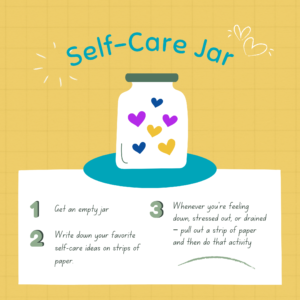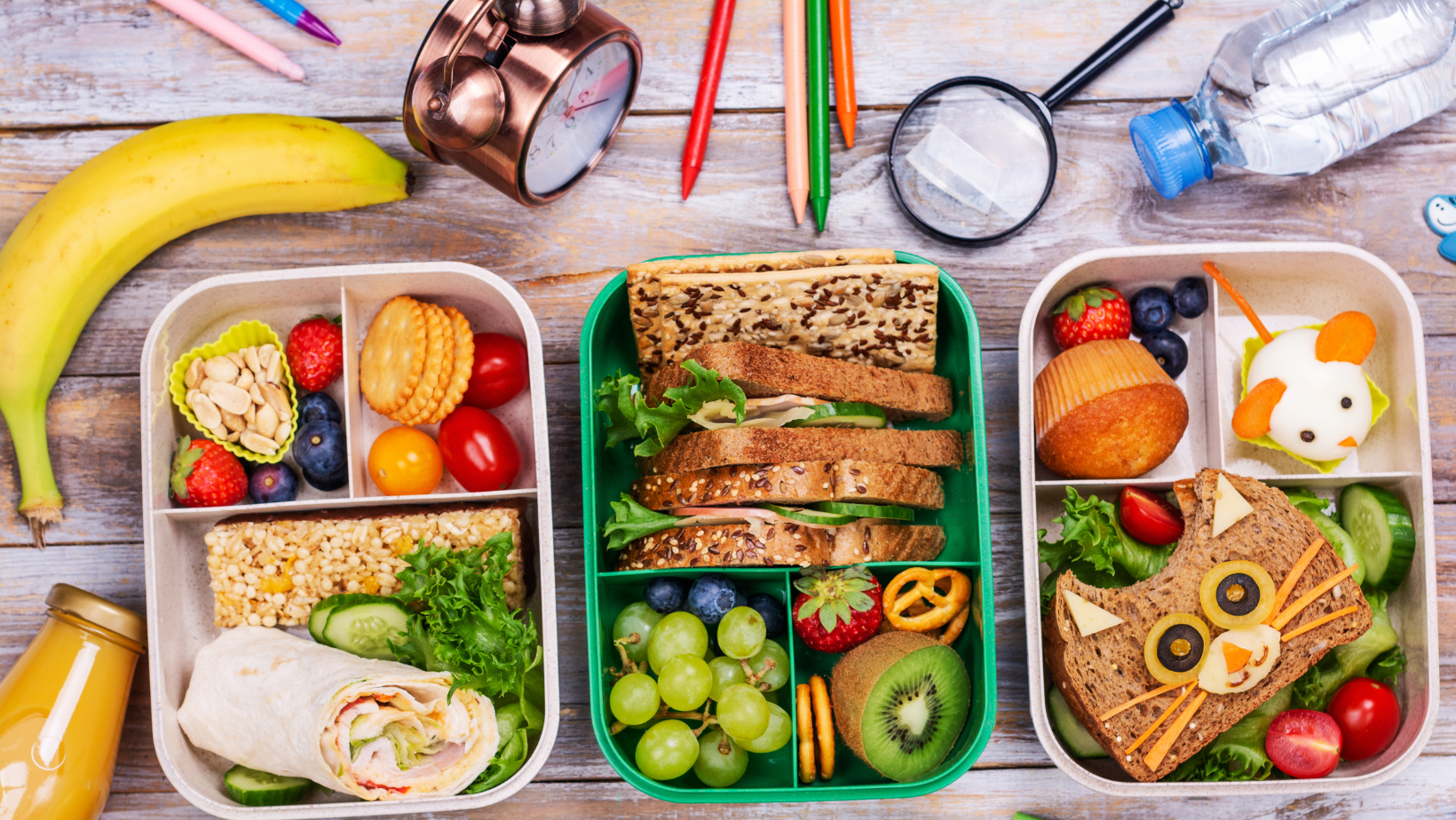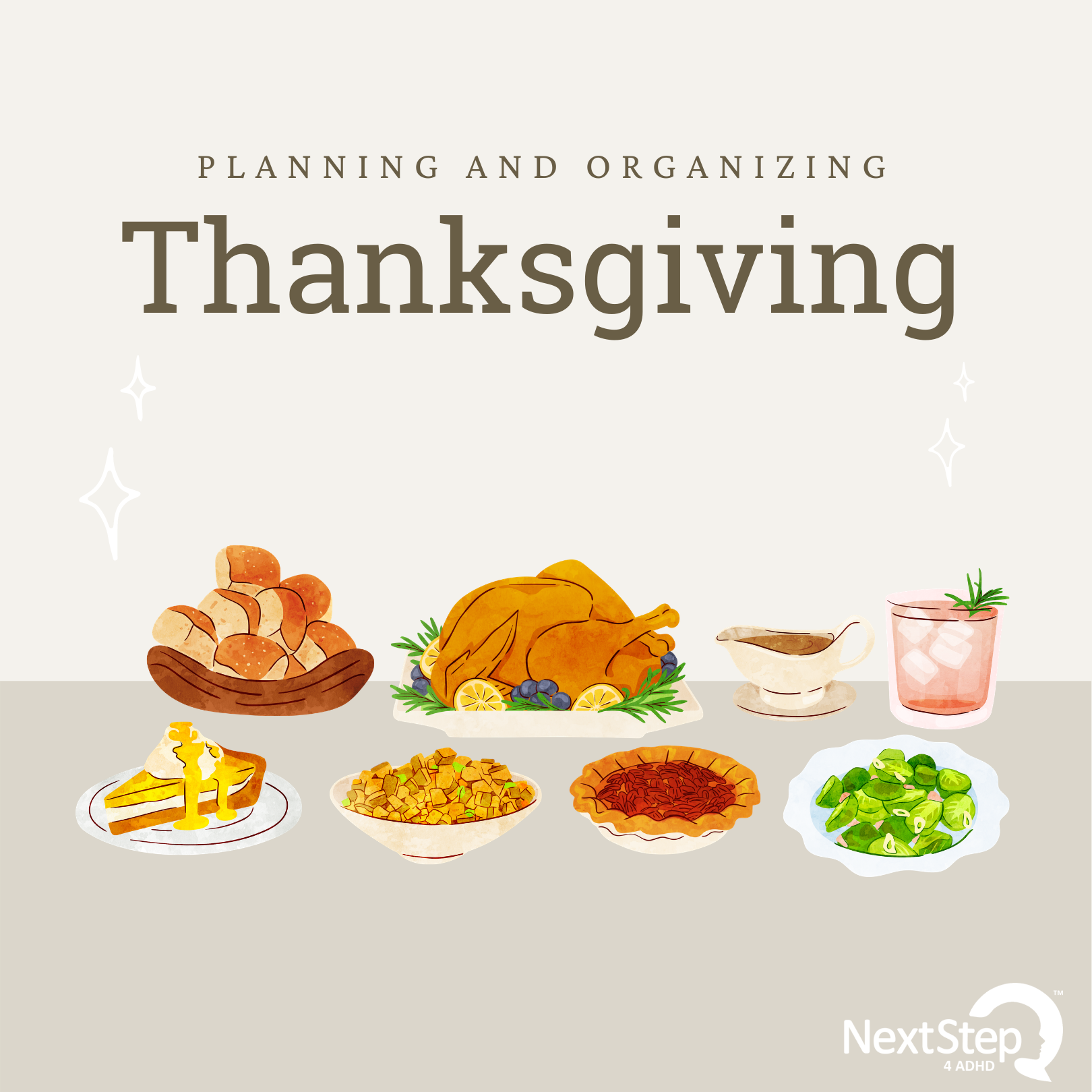
Caring for Children and Aging Parents During the Holidays
The holiday season is often viewed as a time of joy, family, and togetherness. However, for those in the “sandwich generation”— adults caught between the responsibilities of childcare and caring for aging parents — this period can present unique challenges. The demands of managing the needs of a younger and older generation simultaneously can be particularly heightened during the festive season. It can be particularly challenging if you or your child have ADHD.
Read on as the Next Step team shares tips for navigating the holiday season when you’re caring for two generations.
The Holiday Stress for the Sandwich Generation
The holidays often amplify the pressures for those balancing childcare with the responsibilities of caring for aging parents. The image of a perfect holiday season can starkly contrast with the reality of these demanding caregiving roles. This leads to increased stress and feelings of being stretched too thin.
Recognizing Symptoms of Anxiety and Depression
For some individuals in the sandwich generation, the heightened stress during the holidays can trigger episodes of anxiety or depression. It’s important to be aware of signs such as persistent sadness, excessive worry, changes in sleep patterns, or a loss of interest in activities once enjoyed. Early recognition of these symptoms is crucial for effective management.
Additional reading on these topics:
- 8 Risk Factors for Depression
- 11 Ways to Help Someone with Depression
- Anxiety at Christmas
- What Is Generalized Anxiety?
The Importance of Self-Care
Self-care is essential for individuals juggling the dual responsibilities of childcare and caring for aging parents. Practical tips for self-care during the holiday season include:
- Setting achievable expectations
- Delegating tasks
- Setting aside ample personal time for relaxation and enjoyment
Planning and organizing can be more challenging if you have ADHD. Use as many of these tips as possible to help you stay organized.
Remember, taking care of yourself is not just a luxury, but a necessity for maintaining your overall well-being.
Click through the image slideshow for a few quick ideas to help you relax.
Additional reading on self-care:
Try a Self-Care Jar
Here’s a fun idea for the whole family to try:

Support Systems and Resources
Establishing a support network is vital. This network can comprise friends, family, and community resources. Support groups tailored for the sandwich generation or caregiver support can provide a sense of community and understanding.
Seeking Professional Help
When stress becomes overwhelming, it may indicate the need for professional assistance. Consulting with a mental health professional can provide valuable strategies for managing stress, addressing emotional challenges, and enhancing overall mental health.
The dual challenges of caring for children and aging parents during the holiday season are substantial. Recognizing when additional support is needed and taking steps to prioritize mental health are key.
Here for You
If you’re navigating the complexities of the sandwich generation this holiday season, we’re here to help. Our practice offers support, guidance, and professional assistance to help you manage these challenges. Contact us to schedule an appointment and start your journey towards a more balanced holiday season.
Learn More
Quiz: Are You a Meal Prepper? Discover the ADHD Benefits
Meal prepping can be a game-changer, especially for those with ADHD. It’s not just about organizing your meals; it’s about improving focus, managing impulsivity, and setting yourself up for success.
Take this quiz to find out if you’re a meal prepper and learn about the incredible benefits it offers for individuals with ADHD.
Quiz Time: Are You a Meal Prepper?
1. Do you plan your meals in advance, at least a few days ahead?
- Always
- Sometimes
- Rarely
- Never
2. How often do you cook multiple servings of a dish to eat throughout the week?
- Every week
- Once in a while
- Rarely
- Never
3. How do you feel about grocery shopping?
- Excited, I love it!
- Neutral, it’s okay.
- Overwhelmed, but I manage.
- It’s a struggle.
4. What’s your reaction when you’re hungry but don’t have a meal ready?
- No worries, I have a stash of prepped meals.
- I’ll figure something out quickly.
- I might grab unhealthy snacks.
- Panic mode – it’s chaos!
5. How much time do you spend on meal preparation each week?
- About an hour a day
- A few hours on the weekend
- Whenever I find time
- I play it by ear
Results:
If you answered mostly:
- A’s: Congratulations, you’re a meal prepper pro! You understand the value of planning ahead and have likely experienced the benefits it brings.
- B’s: You’re on the right track! You might not meal prep consistently, but you’re aware of its advantages.
- C’s: Meal prepping isn’t your strong suit, but you’re open to exploring its potential benefits.
- D’s: Meal prepping could be a game-changer for you. Consider the positive impact it could have on managing ADHD symptoms.
The ADHD Benefits of Meal Prepping
1. Improved Focus:
Meal prepping reduces decision fatigue by eliminating the need to figure out what to eat each time you’re hungry. This helps conserve mental energy, allowing you to stay focused on important tasks.
2. Reduced Impulsivity:
Having prepped meals on hand helps prevent impulsive food choices, which can be common for individuals with ADHD. You’re less likely to grab unhealthy snacks or opt for fast food when you already have nutritious meals ready to go.
3. Time and Energy Savings:
Meal prepping might seem time-consuming upfront, but it saves time and effort throughout the week. You’ll spend less time cooking on a daily basis, giving you more room for other activities.
4. Consistent Nutrition:
People with ADHD often struggle with maintaining consistent eating patterns. Meal prepping ensures that you have balanced meals available, which can positively impact your overall well-being.
5. Stress Reduction:
The peace of mind that comes with knowing you have meals ready can significantly reduce stress. You won’t have to worry about last-minute food arrangements.
Recap
Meal prepping isn’t just for fitness enthusiasts; it’s a powerful tool for staying organized and ensuring you maintain a balanced diet. By taking the quiz and considering the benefits, you’ve taken the first step toward incorporating this strategy into your routine. Give meal prepping a try and experience the positive impact it can have on your focus, impulsivity, and daily productivity. Your journey to better ADHD management starts in the kitchen!
Need Help Managing ADHD?
Do you need help with time management or other organizational strategies? Whether you need ADHD coaching or therapy, our multidisciplinary team has everything you need under one roof. To get started, request an appointment today.
Learn More
Planning Thanksgiving Dinner with ADHD? Tips for Success
Organizing and planning can be challenging tasks for adults with ADHD — and those are two skills necessary for planning a Thanksgiving dinner.
Thankfully, executive function skills — which include planning and organization — are teachable skills. And that means planning a successful Thanksgiving dinner is within your reach.
Here’s what you need to know:
Plan Your Menu in Advance

First things first: plan your menu!
Organizing your thoughts and goals for the day is important. You might benefit from using a journal to plan your menu. Be sure to plan for all components of your meal, including:
- The main dish (it’s okay if turkey isn’t your thing)
- Vegetables
- Starches, including mashed potatoes and sweet potatoes
- Side dishes, including cranberries or other sauces
- Appetizers
- Bread or rolls
- Desserts
- Beverages
Creating this master menu is step one in managing your time on Turkey Day. For example, you might choose to make some of these items the day before Thanksgiving Day. You might need to take out your turkey from the freezer. We’ll get to time management tips later in this article, but for now, know that your menu is the first step to a successful event.
Need inspiration? Here’s a list of 50 tasty Thanksgiving recipes.
Prepare for Your Grocery Trip
Planning for a big event like Thanksgiving can seem daunting especially when your ADHD symptoms ― poor time management, inattention, difficulty organizing —start infiltrating your grocery shopping trip. Another ADHD symptom ― impulsivity ― makes grocery trips particularly difficult.
The best way to combat these challenges is to prepare for your grocery trip. Trying to plan a meal for a large party is difficult without planning, whether you have ADHD or not.
Before you even head to the store, you’ll need:
- A grocery list (including any items you need for the party e.g., paper plates, candles, décor)
- A designated time to shop (trying to squeeze in a large shopping trip isn’t ideal… allot plenty of unrushed time to shop)
- A full belly (shopping on an empty stomach increases your risk of impulsive buys and deviations from your list)
Tips for Making Your Grocery List
- Always write your list down, either on paper or in a digital grocery app. This will help eliminate forgotten items.
- Include quantities of items e.g. two cans of pumpkin puree or one 32-ounce can
- Be specific e.g. bread flour versus cake flour
- List out ingredients for a recipe e.g., instead of writing “pumpkin pie stuff” write two cans of pumpkin puree, eggs, two boxes of pie crust mix, 1-ounce jar of pumpkin spice mix, 1 pint of heavy whipping cream… and so on
Use Your Calendar
There’s a lot going on in the days leading up to Thanksgiving, and a calendar can you keep track of everything you need to do.
If time management is especially difficult for you, a calendar is even more so important.
You might use your calendar to create a schedule for:
- Setting out the turkey — some turkeys need days to thaw. You can check here.
- Setting the table
- Preparing any side dishes prior to Thanksgiving
- When to start baking
- When to put beverages in the fridge
- When to start cleaning for guests (you might start your cleaning days before Turkey Day and focus more on baking closer to the big day)
A well-organized calendar can help prevent last minutes scrambling.
Delegate
Just because you’re hosting Thanksgiving, doesn’t mean you have to do it alone. Delegating tasks, even small ones, can help the day run smoother.
Ideas include:
- Giving small (but well-defined) tasks to your children
- Be specific: instead of asking for “help” ask for specific help e.g., “sweep the dining room” or “write names on the place settings”
- Ask for friends or family members to bring a side dish (but write this on your menu so you can keep track!)
Delegating doesn’t just mean friends or family helping you. You might delegate or receive help in other ways too. This might include hiring a cleaning service to clean your house the day before Thanksgiving, or you might order pies from a local bakery. Note that these all require pre-planning so if you think you’ll outsource help, start the preparations well in advance.
Don’t Overestimate the Power of Simple
If you feel overwhelmed, try to focus on simple things. If the thought of roasting a whole turkey overwhelms you, try a turkey breast instead. If the idea of juggling oven time between pies and rolls is too much, go for simple. Order rolls from a bakery to free up some space.
At the end of the day, Thanksgiving is about coming together as a family and celebrating love, joy, and things we are thankful for in life — and a simple meal can be part of that.
Tools to Help You Plan
Here are a few suggestions to make planning Thanksgiving even easier:
- Online or paper calendar
- Online or paper grocery list
- Online grocery delivery services (Some grocery stores offer delivery, but you can use other apps like Instacart too.)
- The number to the Turkey Hotline! If you have a cooking problem, the Butterball Turkey Hotline can help!
Enjoy the Day!

No matter how the day unfolds, remember to cherish the memories and celebrate those you love! If something goes wrong, or an ingredient goes missing, take a deep breath, center yourself, and carry on.
Need Extra Help with Planning and Organization?
If you’re still feeling overwhelmed with planning and organizing tasks, we can help. Here at Next Step 4 ADHD, we provide comprehensive, multimodal support, including:
- One-to-one ADHD coaching
- Medication management
- Therapy
- Online courses, including our FREE self-care course which focuses on nutrition
- Group courses, including Planning & Organizing Group Program
To make an appointment or to learn more, call us at 502-907-5908. You can also request an appointment here.
Learn More



